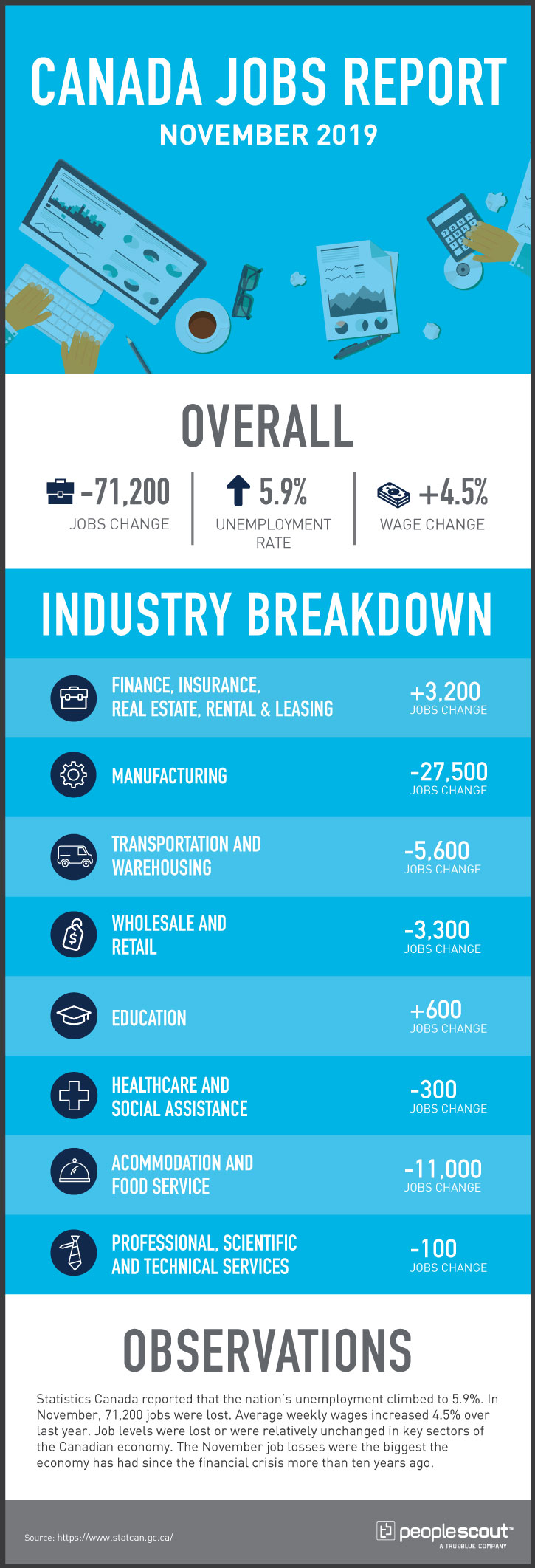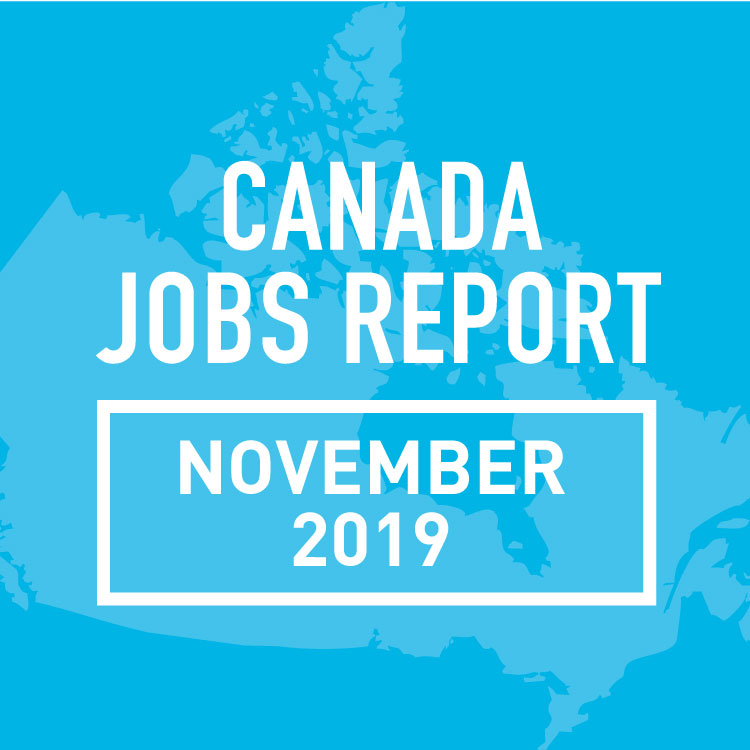Statistics Canada reported that the nation’s unemployment climbed to 5.9%. In November, 71,200 jobs were lost. Average weekly wages increased 4.5% over last year. Job levels were lost or were relatively unchanged in key sectors of the Canadian economy. The November job losses were the biggest the economy has had since the financial crisis more than ten years ago.

The Numbers
71,200: The economy lost 71,200 jobs in November.
5.9%: The unemployment rate rose to 5.9%.
4.5%: Weekly wages increased 4.5% over the last year.
The Good
Statistics Canada reported that strong wage growth continued in November with average weekly wages increasing by 4.5% over twelve months. When viewed from an annual growth perspective, employment gains since November last year totaled 293,000 (+1.6%), with the increase largely accounted for by full-time work. Over the same period, total hours worked also grew by 0.2%.
While the job-loss numbers are significant, 20,000 of those jobs were due to the ending of temporary employment related to the recently completed federal elections.
The Bad
Canada experienced its worst job loss in November since the Great Recession. Jobs were shed in both goods-producing industries and the service sector.
In the goods-producing sector, fewer people worked in manufacturing which dropped by 28,000 positions and in natural resources (-6,500), with the bulk of the declines in each of these industries happened in Quebec. On an annual basis, Canada-wide employment in manufacturing was little changed, but it has declined in natural resources (-25,000 or -7.2%), mostly in Alberta and British Columbia. Job losses in the services-producing sector were led by those in public administration, where the number of workers fell by 25,000 in November.
Quebec was the hardest hit province in November where 45,000 fewer people were employed in November. This decline is primarily attributable to manufacturing and the accommodation and food services sector. Since more people looked for work in the province while jobs were dropping, the unemployment rate in the province increased by 0.6 percentage points to 5.6%.
Employment in Alberta fell by 18,000 in November, with declines happening in a number of sectors led by wholesale and retail trade. With more people seeking work, the unemployment rate in Alberta rose by 0.5 percentage points to 7.2% last month. Employment in British Columbia fell by 18,000 in November, with the losses spread across several industries. The unemployment rate rose to 5.0% in November from 4.7% in October.
Even in those provinces where the job markets did not have significant losses, unemployment rates rose. While employment in Ontario held steady in November, the unemployment rate increased by 0.3 percentage points to 5.6% as a result of more people looking for jobs. Employment in Saskatchewan was little changed, while the unemployment rate rose to 5.8% (+0.7 percentage points) as more people looked for work. There was also little employment change in Manitoba, and the unemployment rate edged up 0.3 percentage points to 5.6% in November.
The jobs report was seen by some analysts as shedding light on long-term weak spots in the Canadian economy, especially in manufacturing. Josh Nye, Senior Economist at RBC noted that there has been a steady decline in manufacturing jobs and that with ongoing trade uncertainty, there is no sign of recovery in the near future:
“That decline is pretty eye-catching. It’s one of the bigger stories. It’s one of the weaker industries if you’re tracking employment growth year-to-date, down an average 4,000 per month. Manufacturing has been weak globally this year. You’ve got rising trade tensions between the world’s two largest economies and slowing global growth that’s really been concentrated in the industrial sector.
Broadly speaking this is a sector that hasn’t generated much in the way of job growth for a number of years now so it’s hard to see that narrative changing in 2020.”
Canadian Career-Changers are Happier for Doing So. Could They Also be an Untapped Source of Talent?
The majority of Canadians who have switched careers say that they are happier because of their decision to do so according to a recent poll by Indeed Canada. Those who have been recently downsized or are otherwise concerned about their employment outlook or career future may choose to search for work outside their current field.
Almost nine out of 10 Canadians who have made a career change say they’re happier since switching career paths. Researchers polled 1,023 randomly selected full-time workers from a range of industries as well as education levels and found that 38% of them had made a complete career change at some point. Of the respondents, 35% said they were either currently thinking about switching careers or have thought about doing so. Of those respondents who have made a career change, 87% said they are happier since making the change.
Two important elements had to be a part of these Canadian’s successful career transformations. First, the person making the career switch had to possess the skills to begin a new career or be ready and able to acquire them. Second, the employers who hired them had to have a broad view of their new employee’s potential to succeed, even if they have not had a matching job description in the past.
Rather than limit candidate sourcing to those in a given career category, employers can broaden their search to include those with different professional backgrounds that may be motivated to change careers and could be attracted to their job offerings. Identifying these individuals, especially for hard-to-fill positions in challenging markets needs the expertise and experience which is not always found in human resources departments that may already be stretched to the limit in their talent acquisition efforts. For this reason, it is a good idea to partner with a recruitment process outsourcing company with the knowledge and skills that can lead to the successful onboarding of those individuals from a wide range of career paths.

![[Webinar] Smart Hiring in the AI Age: What UK Candidates Are Really Doing in 2025](https://www.peoplescout.com/wp-content/uploads/2025/05/AI-enable-applicant-report-320x320.jpg)
